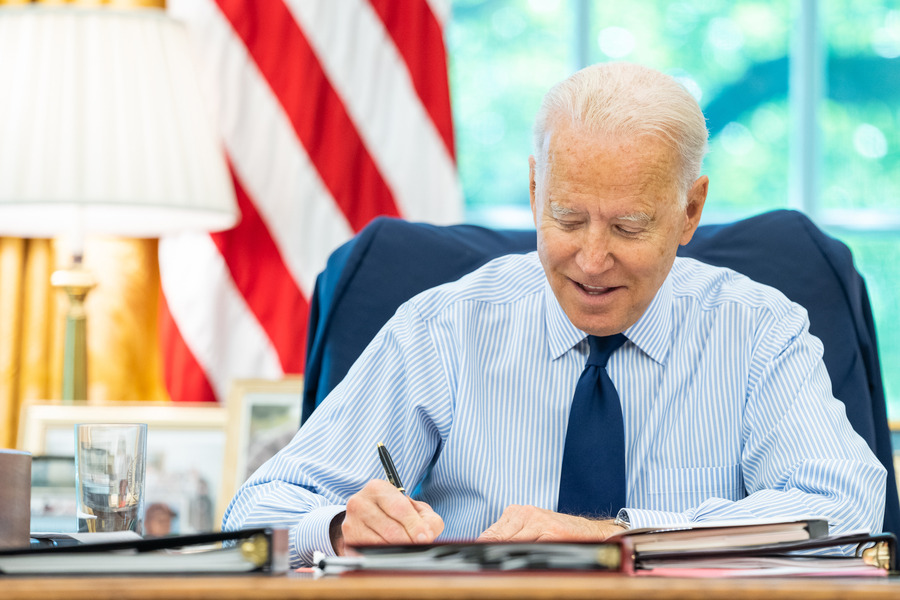Why the Mueller Indictment Doesn't Allege the Russians Swung the Election
In announcing that 13 Russian nationals and three Russian companies were being charged for “seeking to interfere in the United States political system,” Deputy Attorney General Rod Rosenstein made it clear that the indictment contained “no allegation … that the charged conduct altered the outcome of the 2016 election.” Could a future indictment show that? Maybe, but I think that’s unlikely. Here’s why.
Published by The Lawfare Institute
in Cooperation With

In announcing that 13 Russian nationals and three Russian companies were being charged for “seeking to interfere in the United States political system,” Deputy Attorney General Rod Rosenstein made it clear that the indictment contained “no allegation … that the charged conduct altered the outcome of the 2016 election.” Could a future indictment show that? Maybe, but I think that’s unlikely. Here’s why.
I doubt that Rosenstein would make a point of discussing the outcome of the election if he really expected that some future indictment would claim the results were compromised. If Rosenstein knows now that there is such evidence, when that fact does comes out it—as it inevitably would—it would hardly be flattering to him or the Mueller investigation itself.
Indeed, if Mueller’s enterprise is to have the credibility it needs, it must distance itself from any suggestion it is misleading the public in any way. I don’t think Americans like seeming to have been fooled by public officials, and I would expect that Rosenstein and Mueller are keenly aware of the strategic downsides of appearing to deceive (even if there are tactical benefits to inducing complacency in the Trump camp).
Consider, for example, what might happen if Mueller later presented evidence of collusion between Trump campaign officials and the Russian government—a very distinct issue from whether the Russians successfully tainted the election, which the president may not appreciate. If that coincided with a revelation that the Mueller investigation had evidence of election compromise all along, defense counsel—not to mention politicos—could play the outrage card in a myriad of public settings and have a heyday of the “are you trying to hoodwink us again?” variety. That’s not the message prosecutors want conveyed to a jury pool.
Even those hostile to Trump might be appalled that government officials thought they were entitled to withhold information that’s so indisputably critical to the citizens of a democracy. Some things have such immediate and grave importance to the body politic that they really do transcend any particular criminal investigation. True, Rosenstein could insist that he technically only said that there was no evidence in the original indictment, but that’s the kind of legalistic quibbling that, in my experience, the public loathes. So I think it’s doubtful (albeit not impossible) that Mueller is currently harboring evidence that election results were skewed by Russian scheming.
There are other, more technical reasons beyond trying to read the tea leaves about Rosenstein’s reasoning to conclude that the Russian election machinations did not succeed in changing the results. In December 2017, the Columbia Journalism Review (CJR) did an analysis of just such Russian efforts during the election and determined:
[W]e believe that the volume of reporting around fake news, and the role of tech companies in disseminating those falsehoods, is both disproportionate to its likely influence in the outcome of the election and diverts attention from the culpability of the mainstream media itself.
CJR points out that even if there were millions of shares, reactions, and comments involving the top 20 fake news stories on Facebook, it’s wrong to overstate their influence because despite the seemingly large numbers, they actually would have “accounted for only 0.006 percent of user actions.”
Similarly, CJR critiques a New York Times story which “reported that Russian agents ‘disseminated inflammatory posts that reached 126 million users on Facebook, published more than 131,000 messages on Twitter and uploaded over 1,000 videos to Google’s YouTube service.’” CJR counters:
Big numbers indeed, but several paragraphs later the authors concede that over the same period Facebook users were exposed to 11 trillion posts—roughly 87,000 for every fake exposure—while on Twitter the Russian-linked election tweets represented less than 0.75 percent of all election-related tweets. On YouTube, meanwhile, the total number of views of fake Russian videos was around 309,000—compared to the five billion YouTube videos that are watched every day.
Bottom line? Citing yet another study, CJR concludes that the Russian “fake news” effort “would have had to be much larger—roughly 30 times as large—to account for Trump’s margin of victory in the key states on which the election outcome depended.” And it’s not just CJR that’s critical of the Russian operation. As CNBC’s Jake Novak notes, a recent academic study shows that “the best estimate of the effects of campaign contact and advertising on Americans’ candidates choices in general elections is zero”—so the Russian ads might not have had any effect in persuading voters at all.
Even if we assume that political advertisements are effective, the Russians would have had to overcome the effect of the massive resources of the Clinton campaign. According to the Washington Post:
Clinton's unsuccessful campaign ($768 million in spending) outspent Trump's successful one ($398 million) by nearly 2 to 1. The Democratic National Committee and left-leaning outside groups also outspent their Republican counterparts by considerable margins.
With that kind of financial superiority, it’s no surprise that the 800-strong Clinton campaign staff wildly outnumbered Trump’s, which totaled a mere 130. Additionally, Clinton had the money to dwarf Trump’s media buys. In the crucial period shortly before the election, NBC News reported that Clinton was outspending Trump nearly three-to-one on TV and radio ads. To be clear, this not a critique of Clinton but rather, an impersonal assessment of the sheer size of the campaign enterprise the Russian social media ploys sought to upend.
And it wasn’t just paid advertising in which Clinton had a significant advantage over Trump, it was also her nearly total domination of America’s editorial offices. Business Insider said “Clinton's final endorsement tally crested 240 editorial boards,” as opposed to just 19 for Trump. Furthermore, Clinton collected an “overwhelming” number of endorsements from the U.S.’s best known celebrities (though it isn’t at all clear that they helped her). In other words, from a conventional electioneering perspective, Clinton did many of the right things.
Still, there is a persuasive argument that traditional metrics of an effective campaign – TV and radio ads, newspaper endorsements, etc.—in which Clinton prevailed simply did not work in this election. Election postmortems (from Wired and Politico, among others) suggest that the Trump team invested more heavily in social media and Facebook advertising compared to Clinton’s focus on standard campaign tactics.
So it wasn’t just Russian trolls using Facebook to attack Clinton and support Trump: The Trump campaign was doing so aggressively and independently—and it worked. (There is nothing in the indictment that suggests any kind of coordination between the Trump campaign and Russian trolls in disseminating ads on Facebook.) And according to Facebook General Counsel Colin Stretch, the Russians spent just $46,000 on pre-election ads compared to $81 million from Trump and Clinton combined. The Russian ads were a drop in the bucket as far as political advertising on social media went.
In short, as energetic as it may have been, the Russian effort was still too puny—and perhaps too ill-directed and inartful—to be decisive. This reinforces the CJR’s conclusion that Russia’s information operation, while a “real problem” and rightly concerning, was not what determined the outcome of the election. Likewise, the Times has written that a recent study shows that “the people most likely to consume fake news were already hyperpartisan and close followers of politics, and that false stories were only a small fraction of their media consumption” Thus, the Times notes, “Russian efforts are indicators—not drivers—of how widely Americans had polarized” (emphasis added).
What about the Russian hacking that leaked the DNC emails, as well as those of Podesta and others? The hacked emails did impose unwanted transparency on the DNC, but that was an altogether different and arguably less-dangerous threat than that posed by other Russian activities, including “fake news” and its ilk. The latter was an ongoing campaign, while the DNC hack was a finite incident. Over time the DNC successfully diverted attention away from the embarrassing and, to some, the distasteful information the hack revealed. The story became not what was revealed, but who was behind the revelation. Eventually, the DNC could posture itself as an innocent victim of a Russian cyber assault, as opposed to a petri dish of nefarious political intrigue.
And it’s hard to disaggregate the effect of the email releases from other factors that might have swayed voters. For example, many Catholics found the references to their faith in the Podesta emails “extraordinarily patronizing and insulting”—and Catholics did vote for Trump by a margin of seven points. But that might also have been a result of Clinton’s stance on abortion, her failure to reach out to working class Catholics in the Rust Belt, or insufficiency of the support for her candidacy from Latino Catholics relative to that they gave Barack Obama.
So there are many reasons for Hillary Clinton’s defeat. But it’s a mistake to give the Russians credit they don’t deserve for that result. Nonetheless, it’s also very dangerous to underestimate them or to assume that they won’t try again.
They most likely will, and they’ll do so in an even more robust and sophisticated way. If the Russians used 1,000 trolls in 2016, they have the talent pool to vastly increase that number if they want. Moreover, with its “rich tradition of subversion,” the Russian intelligence apparatus is adept at studying previous operations and coming up with even more inventive strategies. After all, as Jack Goldsmith notes, “with a relatively paltry budget of $1.25 million per month, Russia achieves the most disruptive information operation in history that continues to roil American politics even if it did not swing the election.” Count on Russia to give it another try.
The lesson is obvious: America still needs to do whatever it takes to preserve the sanctity of the electoral process against the Russians or any other foreigners “seeking to interfere in the United States political system.”




